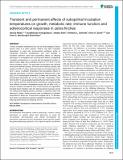Transient and permanent effects of suboptimal incubation temperatures on growth, metabolic rate, immune function and adrenocortical responses in zebra finches
Abstract
n birds, incubation temperature can vary by several degrees Celsius among nests of a given species. Parents may alter incubation temperature to cope with environmental conditions and/or to manipulate embryonic development, and such changes in incubation behavior could have long-lasting effects on offspring phenotype. To investigate short- and long-term effects of suboptimal incubation temperatures on survival and physiological functions in zebra finches, eggs were incubated at 36.2, 37.4 or 38.4°C for the entire incubation period. The post-hatch environment was identical among the treatment groups. We found that hatching success was lowest in the 38.4°C group, while post-hatch survival was lowest in the 36.2°C group. Incubation temperature had sex-specific effects on offspring phenotype: incubation temperatures affected body mass (Mb) but not physiological parameters of males and conversely, the physiological parameters but not Mb of females. Specifically, males from the 38.4°C group weighed significantly less than males from the 36.2°C group from the nestling period to adulthood, whereas females from different incubation temperature groups did not differ in Mb. In contrast, females incubated at 36.2°C had transient but significantly elevated basal metabolic rate and adrenocortical responses during the nestling and fledgling periods, whereas no treatment effect was observed in males. Innate immunity was not affected by incubation temperature in either sex. These results suggest that a 1°C deviation from what is considered an optimal incubation temperature can lower offspring performance and offspring survival.
Citation
Wada , H , Kriengwatana , B , Allen , N , Schmidt , K L , Soma , K K & MacDougall-Shackleton , S A 2015 , ' Transient and permanent effects of suboptimal incubation temperatures on growth, metabolic rate, immune function and adrenocortical responses in zebra finches ' , Journal of Experimental Biology , vol. 218 , no. 18 , pp. 2847-2855 . https://doi.org/10.1242/jeb.114108
Publication
Journal of Experimental Biology
Status
Peer reviewed
ISSN
0022-0949Type
Journal article
Collections
Items in the St Andrews Research Repository are protected by copyright, with all rights reserved, unless otherwise indicated.

